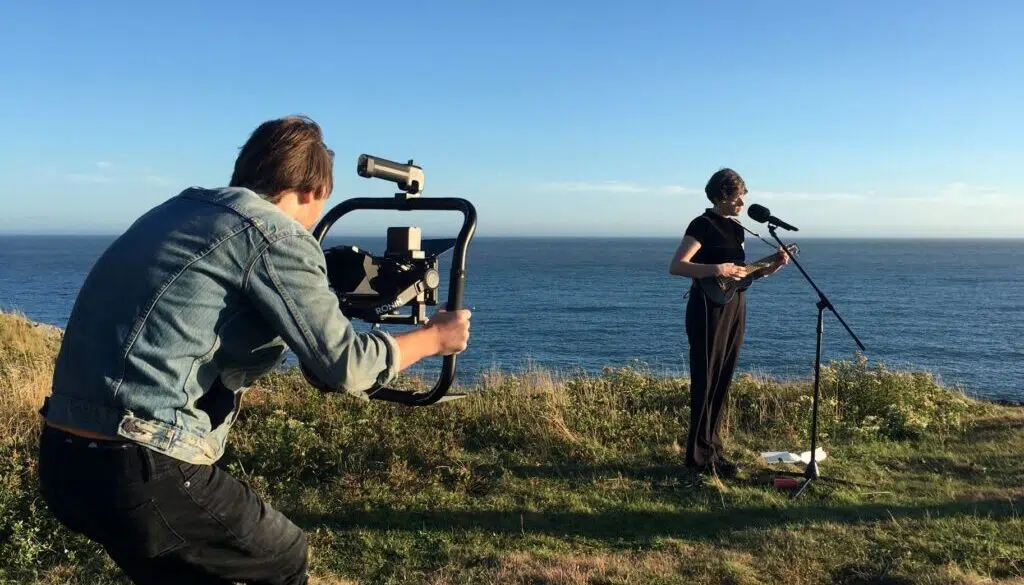There is lots of local TV coming out of New Brunswick these days, helping to prime the province for a bigger, more robust film and TV sector in the province. But local insiders say the industry still faces problems of scale that are preventing it from grabbing those big, multi-million-dollar productions.
Anthems and Acres debuted on Bell Fibe TV on February 10. This new program takes a look at local recording artists in local outdoor settings throughout New Brunswick. Each of the six episodes features a new artist and the recordings were all done live in the elements for an authentic experience.
Also on Bell, Maestro Chef Wes takes ex-Toronto hip-hop legend turned Saint John transplant, Maestro Fresh Wes, and lets him explore his culinary side while touring the Maritime provinces. It’s a mix of food, music, and Maritime hospitality and is already the third most-watched show on TV1 after debuting a few weeks ago.
Building the foundations of a film industry
There’s no shortage of talent and stories to be told in New Brunswick, and there are an increasing number of producers agile enough to jump on these opportunities when they arise.
“It was a bit of an ambitious project because we’re putting a lot of variables together,” says Raven Blue, one of the producers of Anthems and Acres.
“We’re basically setting up a recording studio and TV studio, in outdoor locations with insects and wind and rain and all of those variables,” Blue says. “We thought it sounded crazy …. But that’s what we as a company like to do, we like things that are a little bit challenging and difficult or that haven’t really been done.”
The company he’s referring to is Industrial Parks Collective, a community-based producer of Atlantic Canadian creativity that helps artists with everything from grant writing to providing studio spaces.
The collective is a solution to the lack, at times, of the critical mass needed to sustain a large film and tv production industry in southern New Brunswick. It’s a movement that is creating opportunities and building skills the industry can set its foundation on.
Taxes, access, and labour are all roadblocks
Lauchlan Ough is a television producer based in Saint John whose latest project was Maestro Chef Wes.
He says Covid-19 restrictions presented some new opportunities for crews and producers in New Brunswick. The Atlantic bubble limited people from outside of the region and left bigger companies looking for local talent rather than flying in their own crews. One of those opportunities led to him meet Maestro Fresh Wes.
It sparked a creative relationship that led to the collaboration on the show, which saw two episodes shot in New Brunswick, two in Nova Scotia, and two in PEI.
“Coming here, it’s one of those interesting scenarios in that I think it’s actually been good for him,” says Ough of Maestro Fresh Wes’ move out of the Toronto entertainment epicentre to Saint John. Opportunities with Race Against the Tide, and now with this Anthony Bourdain-eque turn towards food, came about due to being the right person in the right place at the right time.
“Our neighbours in Nova Scotia have a really robust tax credit program that’s well-funded and well-staffed. They also have the resources and the infrastructure and the personnel to staff, say a Netflix or a Disney+ show.”
He says that even though New Brunswick is offering tax credits, the foundation of crews, studios, and other infrastructure necessary to run one of these massive productions simply isn’t there at the levels needed.
Even issues like less frequent flights to the province from limited destinations make the prospect of sending people here to work more complex and ultimately time-consuming and expensive.
That makes it hard for an outsider to take a chance on the province, when going somewhere else would be so much easier.
“In New Brunswick, we’re doing some shows, but not anywhere on the same scale as Nova Scotia, and not even remotely close to what Toronto or Vancouver would be doing. … Since we haven’t really had a formal industry for so long, we just don’t have those same advantages.”
“We have to have shows to create capacity, to put people to work for them, to be able to maintain a lifestyle here. It can’t be one show a year that films for a couple of weeks. You can’t pay your bills that way.”
“Am I hopeful, of course,” he says. “In terms of lifestyle and documentary there’s stuff going on, and there is scripted stuff going on in French in Moncton and the Acadian Peninsula.”
Investment and infrastructure still needed in NB
Ough says investment from the government to build the industry from the ground up is key.
“We need to build that path for the people to see the value.”
“Our province’s film and TV sector is currently growing and the department held consultation with stakeholders last fall to help us collaborate on a shared vision for how we can further support that growth,” says Danielle Elliott, the director of communications for New Brunswick’s Tourism, Heritage and Culture department in an email exchange with Huddle.
“The sector identified its current priorities to include addressing labour gaps; attracting more production to the province; working with government to ensure incentives reflect the realities of the sector; and addressing opportunities to enhance production infrastructure in New Brunswick.”
Elliott says proposed federal Bill C-11, which will encourage more Canadian content on streaming services, is on the department’s radar as it makes its way through Parliament.
“We’ll continue to work to support producers and encourage collaboration in decision-making.”
Alex Graham is a reporter for Huddle, an Acadia Broadcasting content partner.







